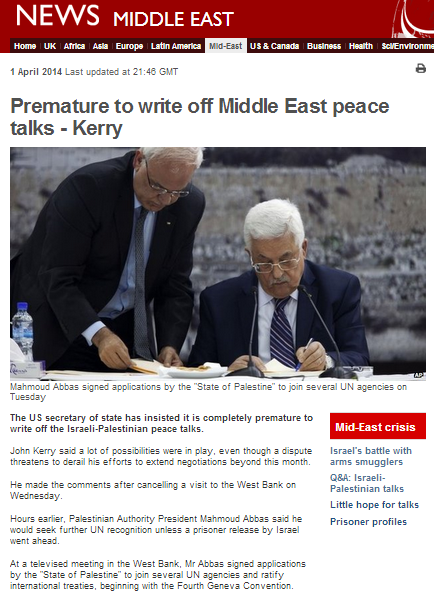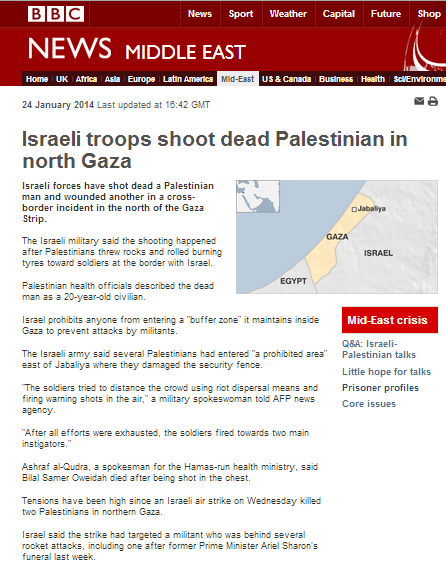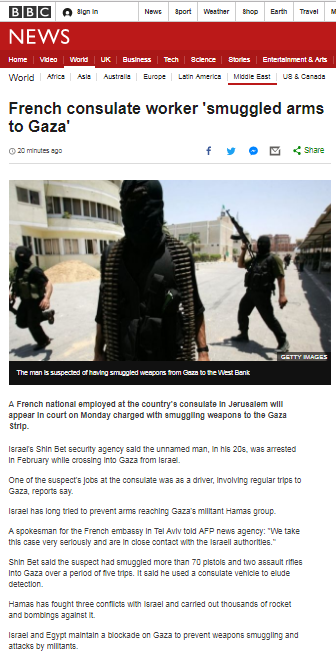On the evening of April 1st an article titled “Premature to write off Middle East peace talks – Kerry” appeared on the Middle East page of the BBC News website. 
The event which prompted the appearance of that article – and its title – was the live televised signing by PA president Mahmoud Abbas of applications to join assorted UN agencies.
The BBC’s description of that event is as follows:
“Hours earlier, Palestinian Authority President Mahmoud Abbas said he would seek further UN recognition unless a prisoner release by Israel went ahead.
At a televised meeting in the West Bank, Mr Abbas signed applications by the “State of Palestine” to join several UN agencies and ratify international treaties, beginning with the Fourth Geneva Convention.
Leading members of his Fatah movement and the Palestine Liberation Organisation (PLO) voted unanimously in support of the move, which the Israeli and the US governments have argued is deeply mistaken.”
However, at no point in the report does the BBC bother to inform readers that, as part of last July’s overtures to this latest round of negotiations, the Palestinian Authority committed itself to refraining from just such a move for the nine-month duration of the talks which does not expire until April 29th.
That above BBC description of Abbas’ move is followed immediately by the following piece of information, which is totally irrelevant to the story’s subject matter given that no building freeze was agreed upon as a condition of the current negotiations.
“Israel meanwhile reissued tenders for 708 homes in the Jewish settlement of Gilo in East Jerusalem, the Israeli pressure group Peace Now said.
Israel captured East Jerusalem from Jordan in the 1967 Middle East war and formally annexed the area in 1980. Settlements built there and elsewhere in the occupied West Bank are considered illegal under international law, though Israel disputes this.”
In what has become standard BBC practice, audiences are herded towards a mistaken belief that Israel is alone in disputing that particular interpretation of Article 49 of the Fourth Geneva Convention and – in breach of BBC editorial guidelines on impartiality – readers are not informed that any other dissenting opinions even exist, let alone of the basis for such disagreement.
The statement that “Israel captured East Jerusalem from Jordan” in 1967 may be technically accurate, but it is also deliberately misleading because it does not inform readers of the relevant fact that Jordan’s 19-year occupation of parts of Jerusalem was not recognized by the international community.
In keeping with its previous article on the subject of the rickety negotiations published earlier on the same day, the BBC again fails to make any mention in this report of the fact that the Palestinian Authority’s stance concerning the fourth tranche of prisoner releases includes the demand to free prisoners who are Israeli citizens. Hence, yet again, no explanation is provided to BBC audiences regarding the highly problematic aspects of that attempt by the PA to claim to represent citizens of another country and the clear interference in Israeli sovereignty that demand signifies. Neither is any attempt made to explain to readers the potential political fallout for Israel’s coalition government which could be brought about by any release of Arab-Israeli prisoners.
In fact, although it is no doubt aware of the PA demand to release 14 Arab-Israelis, the BBC presents them as “Palestinian prisoners” as can be seen below. [emphasis added]
“Mr Kerry has for weeks been trying to persuade both sides to continue the direct negotiations beyond 29 April, but his efforts have been jeopardised by a disagreement over the release of a fourth group of 26 long-term Palestinian prisoners from Israeli jails.
Mr Abbas says they must be freed, in keeping with a promise made by Israel before the negotiations resumed in July after a three-year hiatus.
But Israeli officials say they are reluctant to proceed unless the Palestinians commit to extending the talks, and stress that the releases have always been tied to their progress.
The previous three releases were deeply unpopular with the Israeli public because many of the prisoners were convicted of murdering Israelis.”
Towards its end, the report states:
“Earlier on Tuesday, the US Secretary of State held talks with Israeli Prime Minister Benjamin Netanyahu and chief Palestinian negotiator Saeb Erekat amid reports that they were close to finalising an agreement that would extend the talks until 2015.
Sources cited by US and Israeli media said a deal was emerging in which the fourth batch of Palestinian prisoners would be freed in return for the release of Jonathan Pollard, an American who was jailed for life in 1987 for spying for Israel.”
The BBC refrains from mentioning that in addition to the above, the proposed terms of the “deal” also included the following points:
“The negotiations would continue into January 2015, during which time the Palestinians would commit themselves not to engage in diplomatic warfare against Israel by going to international organizations for recognition. […]
Israel would release an additional 400 Palestinian prisoners during the continuing negotiation period. These prisoners would be picked by Israel, include many minors and women, and not include those with “blood on their hands.”
Israel would “exercise restraint” in releasing government tenders for new homes in the West Bank, meaning that it would issue no new government tenders for housing in Judea and Samaria. This policy would not include Jewish neighborhoods in Jerusalem beyond the Green Line.
This policy would also exclude public building projects, such as roads.”
This report is the third to appear on the BBC News website in the past week in connection with the current talks between Israel and the PLO – see here and here.
None of these articles have explained to audiences the significance of the PA’s refusal to recognize Israel as the Jewish state with regard to ending future claims – and therefore the conflict.
Two of the three articles omit any mention of the Palestinian demand for the release of Israeli Arab prisoners and none of them explain the significance of that demand to audiences.
In this latest report, Israeli offers of concessions are downplayed whilst an irrelevant passage about the re-issuing of building tenders in a Jerusalem neighbourhood is promoted. The fact that this latest PA attempt to join UN agencies breaches agreements reached ahead of the current talks is also disappeared from audience view and no attempt whatsoever is made to place this move within its appropriate context.
If and when these negotiations do fizzle out, BBC audiences will be ill-placed to understand why that happened due to the BBC’s selective and systematic omission of crucial parts of the story in its reporting.




